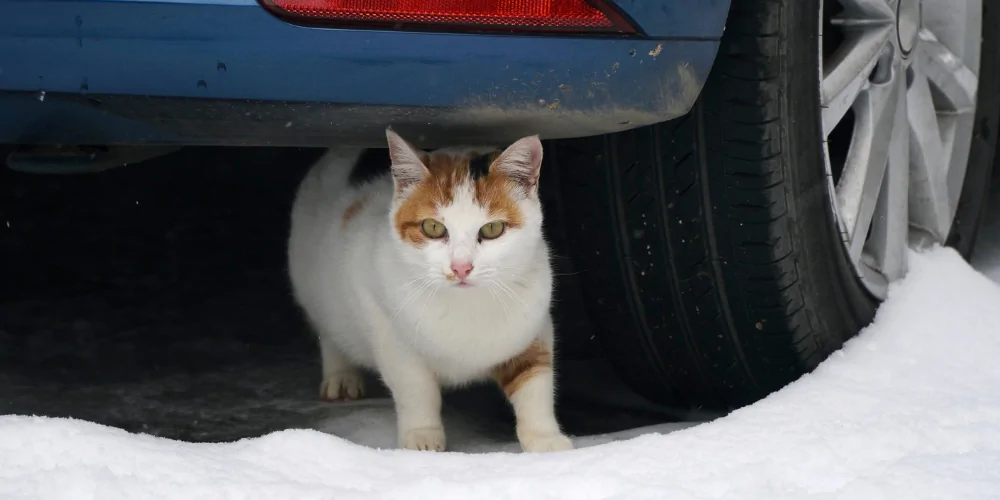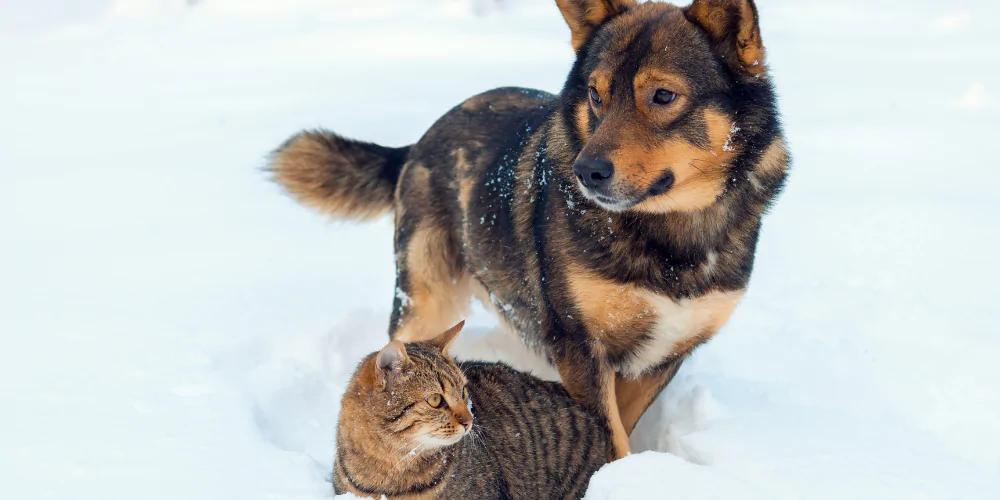
How to protect your pet from common winter illnesses

Dr Jessica May, FirstVet vet
22 December 2021 | 5 minutes read
As the cold season rolls in, many of us are gearing up to protect ourselves against unwanted illness. But what about looking after your pet? Just like their humans, cats and dogs could also get poorly from the cold weather. Join FirstVet vet Dr Jessica May as she looks at some common pet winter illnesses and what you could do to help keep your pet healthy and happy.
Table of contents
- Pet antifreeze poisoning
- Kennel cough in winter
- Dog and cat arthritis flare-up in winter
- Cat flu in winter
- Dog and cat hypothermia

Pet antifreeze poisoning
Many people use antifreeze to speed up the de-icing of their car, but this could be dangerous for pets if they lick it. Antifreeze products with ethylene glycol are the most toxic to your cat or dog, but all types could cause serious harm or death. All it takes is a small amount and this could damage your pet’s kidneys, brain, or lungs.
Some of the signs your pet has drunk antifreeze include:
- Lethargy
- Vomiting/diarrhoea
- Hypothermia
- Seizures
- Wobbly movement
If you think your pet has drunk antifreeze, get in touch with your vet straight away, even if they’re not showing symptoms.
A few ways to keep your pet safe from antifreeze poisoning include:
- Keep them away from areas where a car has parked.
- Don’t let them lick any puddles, especially around cars.
- Walking in urban areas? Wash their paws as soon as you get home.
- Keep any bottles of antifreeze and screenwash out of their reach.

Kennel cough in winter
Kennel cough is around all throughout the year, but can be common in the colder months when your pup’s immune system is lower. This contagious infection is airborne and can be caught from other infected dogs and contact with surfaces or objects they use. It often spreads quickly in places such as kennels. Dogs can also catch it more than once.
The symptoms of kennel cough are very similar to that of a human cold, such as:
- A forceful, hacking cough.
- Runny nose.
- Sneezing.
- Discharge from the eyes.
- Low appetite.
Kennel cough is more serious for puppies and older dogs and may develop into pneumonia. Healthy adult dogs may only get mild symptoms, but this will depend on each individual dog. If you’re concerned about your pooch having kennel cough, speak to your vet for advice.
- Make sure your dog is well-rested.
- Keep any rooms they use well ventilated.
- Keep them away from other dogs while they recover – this could be for at least 14 days.
- Be aware that they could catch kennel cough more than once.
Getting your puppy their primary vaccinations and then regular boosters of the kennel cough vaccination is one of the main ways to help protect them from getting seriously poorly from the virus. Be aware that it won’t stop them from getting the infection, but makes symptoms less severe.

Dog and cat arthritis flare-ups in winter
Did you know that cats and dogs can get arthritis, just like humans? Arthritis is an inflammation of the joints and often starts in middle age for both cats and dogs. Cold winter weather can trigger more flare-ups and make the joints swollen and painful.
Things that suggest your pet could be having an arthritis flare-up include:
- Limping
- Stiffness
- Slow movement
- Lethargy
- Swollen joints
If you notice a change in your pet’s behaviour and think it could be a flare-up, get in touch with a vet. Petsure customers get free 24/7 access to video calls with a FirstVet vet, for fast advice and treatment recommendations whenever needed.
Some ways to manage pet arthritis in winter are:
- Keep their bed warm with a heat pad (but make sure they don’t chew it).
- Take them for regular but short walks.
- Watch their weight, especially as they may want to eat more at this time of year.
- Stop them from overexerting themselves with things like jumping and running.
- Place rugs on hard floors to stop them from skidding.
- Remember to dry them off thoroughly after walks.
Regular levels of exercise and managing your pet’s weight throughout their life is important. Be careful to also not over-exercise puppies.

Cat flu in winter
Also known as feline upper respiratory disease, cat flu can be caused by several different viruses. It spreads through saliva and discharge from the eyes and nose, meaning cats could pick it up from other infected felines, objects or surfaces.
If your cat gets cat flu in the winter months, they may show signs like:
- Mouth ulcers and dribbling.
- Fever.
- Sore throat.
- Sneezing, runny nose and eyes
Cat flu is more severe for kittens and older cats with weaker immune systems. Healthy adult cats may be able to recover at home with no serious symptoms. Always speak to your vet for the right treatment for your feline.
- Give your cat plenty of food and water.
- Try and reduce stress triggers.
- Regularly wipe away discharge with a cotton pad soaked in warm water.
- Try clearing your cat’s airways by bringing them into a steamy bathroom.
One of the main ways to protect your cat from cat flu is to make sure they have their primary kitten vaccinations and then get regular cat flu boosters each year.

Dog and cat hypothermia
Many cats and dogs love to be outdoors in winter, but too much time in the cold or could lead to hypothermia. This is where their body temperature drops but they can’t warm back up, so their body begins to shut down.
Signs your cat or dog has hypothermia are:
- Wobbly movement and bumping into things.
- Lethargy and increased time spent sleeping.
- Pale gums.
- Shivering.
- Unable to wake them up.
If you think your pet has hypothermia, call your vet immediately and follow their advice. You may need to dry them off and slowly warm them up while you’re waiting to take them to an appointment.
Protect your cat or dog from getting hypothermia in winter by:
- Giving them 24/7 access to somewhere safe and dry, such as an insulated outdoor kennel or by installing pet flaps.
- Use waterproof coats when walking your dog to help keep them dry and warm.
- Bring outdoor cats inside if it’s too cold or wet.
- Watch your pet carefully if they go outside a lot in winter.
Give yourself peace of mind and protect your pet during the winter months with flexible pet insurance from Petsure.


